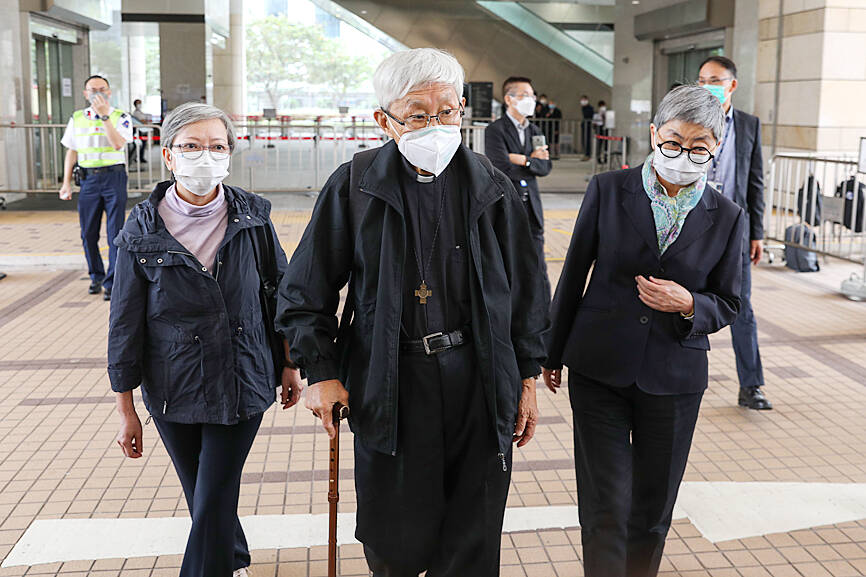A 90-year-old Roman Catholic cardinal and five others were yesterday fined by a Hong Kong court after being found guilty of failing to register a now-defunct fund that aimed to help people arrested in widespread protests three years ago.
Cardinal Joseph Zen (陳日君), a retired bishop and a vocal Hong Kong democracy advocate, arrived at court in a black outfit and used a walking stick.
He was in May arrested on suspicion of colluding with foreign forces under the Beijing-imposed National Security Law. His arrest sent shockwaves through Hong Kong’s Catholic community, and the Vatican at the time said it was monitoring the development of the situation closely.

Photo: EPA-EFE
While Zen the and other democracy advocates have not yet been charged with national security-related offenses, they were charged with failing to properly register the 612 Humanitarian Relief Fund, which helped pay medical and legal fees for arrested protesters beginning in 2019. It ceased operations in October last year.
Zen was a trustee of the fund, alongside singer Denise Ho (何韻詩), academic Hui Po-keung (許寶強), and former pro-democracy Hong Kong lawmakers Margaret Ng (吳靄儀) and Cyd Ho (何秀蘭).
They were each fined HK$4,000 (US$512).

Photo: REUTERS
A sixth defendant, Sze Ching-wee (施城威), was the fund’s secretary and was fined HK$2,500.
The Hong Kong Societies Ordinance requires local organizations to register or apply for an exemption within a month of their establishment. Those who failed to do so face a fine of up to HK$10,000, with no jail time, upon first conviction.
Handing down the verdict, Principal Magistrate Ada Yim (嚴舜儀) ruled that the fund is considered an organization that is obliged to register, as it was not purely for charity purposes.
The judgement holds significance as it is the first time that residents had to face a charge under the ordinance for failing to register, Ng told reporters after the hearing.
“The effect to other people, to the many, many citizens who are associated together to do one thing or another, and what will happen to them, is very important,” said Ng, a veteran lawyer. “It is also extremely important about the freedom of association in Hong Kong under Societies Ordinance.”
Zen said his case should not be linked with the territory’s religious freedoms.
“I haven’t seen any erosion of religious freedoms in Hong Kong,” he said.
The 2019 protests were sparked by a since-withdrawn bill that would have allowed criminal suspects to be extradited to mainland China. Critics worried that such suspects would disappear into China’s opaque and frequently abusive legal system. Opposition morphed into months of unrest in the territory.
The National Security Law has crippled Hong Kong’s democracy ndmovement since its enactment in 2020, with many democracy advocates being arrested or jailed.
The impact of the law has also damaged faith in the future of the territory, with a growing number of people responding to the shrinking freedoms by emigrating.

The CIA has a message for Chinese government officials worried about their place in Chinese President Xi Jinping’s (習近平) government: Come work with us. The agency released two Mandarin-language videos on social media on Thursday inviting disgruntled officials to contact the CIA. The recruitment videos posted on YouTube and X racked up more than 5 million views combined in their first day. The outreach comes as CIA Director John Ratcliffe has vowed to boost the agency’s use of intelligence from human sources and its focus on China, which has recently targeted US officials with its own espionage operations. The videos are “aimed at

STEADFAST FRIEND: The bills encourage increased Taiwan-US engagement and address China’s distortion of UN Resolution 2758 to isolate Taiwan internationally The Presidential Office yesterday thanked the US House of Representatives for unanimously passing two Taiwan-related bills highlighting its solid support for Taiwan’s democracy and global participation, and for deepening bilateral relations. One of the bills, the Taiwan Assurance Implementation Act, requires the US Department of State to periodically review its guidelines for engagement with Taiwan, and report to the US Congress on the guidelines and plans to lift self-imposed limitations on US-Taiwan engagement. The other bill is the Taiwan International Solidarity Act, which clarifies that UN Resolution 2758 does not address the issue of the representation of Taiwan or its people in

US Indo-Pacific Commander Admiral Samuel Paparo on Friday expressed concern over the rate at which China is diversifying its military exercises, the Financial Times (FT) reported on Saturday. “The rates of change on the depth and breadth of their exercises is the one non-linear effect that I’ve seen in the last year that wakes me up at night or keeps me up at night,” Paparo was quoted by FT as saying while attending the annual Sedona Forum at the McCain Institute in Arizona. Paparo also expressed concern over the speed with which China was expanding its military. While the US

SHIFT: Taiwan’s better-than-expected first-quarter GDP and signs of weakness in the US have driven global capital back to emerging markets, the central bank head said The central bank yesterday blamed market speculation for the steep rise in the local currency, and urged exporters and financial institutions to stay calm and stop panic sell-offs to avoid hurting their own profitability. The nation’s top monetary policymaker said that it would step in, if necessary, to maintain order and stability in the foreign exchange market. The remarks came as the NT dollar yesterday closed up NT$0.919 to NT$30.145 against the US dollar in Taipei trading, after rising as high as NT$29.59 in intraday trading. The local currency has surged 5.85 percent against the greenback over the past two sessions, central